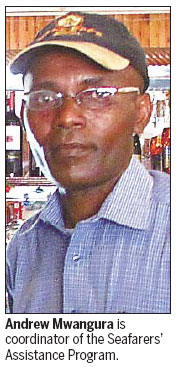Focus
It's time to focus on the causes of piracy off Somali
By Hu Yinan (China Daily)
Updated: 2010-12-06 07:15
 |
Large Medium Small |

MOMBASA, Kenya - Sitting in a Chinese restaurant enjoying some midday refreshment, Andrew Mwangura could have been mistaken for just another middle-aged Kenyan worn out by work.
His black baseball hat, his stripped blue shirt and cream-colored pants, his outdated mobile phone and his soft, deep voice all culminate in a rather mundane appearance that every bit contradicts the uniqueness of the work that he does.
Mwangura, 48, is arguably the most informed individual about what is happening on the Indian Ocean and, more importantly, boasts exclusive contact with both pirates and mariners held hostage near Somali waters.
He is more often than not the first - and sometimes the only - person media outlets around the world come to confirm the hijacking or release of any ship off the Somali coast and beyond.
The lifelong seaman has drawn so much attention, in fact, that award-winning actor Samuel L. Jackson will soon play Mwangura in a Hollywood film about his life. As coordinator of the Seafarers' Assistance Program, a nonprofit charity formed in 1996, he attributes his excellent contacts at sea to the willingness to treat everyone as equals.
"(When) you put people on one level, they'll talk," he told China Daily in an exclusive interview.
Mwangura insists that instead of focusing on naval efforts to combat piracy off Somali waters, the international community should focus on the root causes, such as illegal fishing by foreign fleets and the dumping of nuclear and toxic waste from the developed world.
The worldwide value of illegal, unreported and unregulated fishing stands at $4 billion to $9 billion, with a large chunk coming from Sub-Saharan Africa, particularly Somalia, according to Mohammed Waldo, a Somali specialist working with ECOTERRA International, an NGO that monitors high seas piracy.
Nation building at the grassroots level should be the foundation of any viable measures to curb piracy in East Africa, said Mwangura.
"(It is only) when you address the root causes of (piracy) in Somalia (that) you come up with land-based anti-piracy missions that involve local communities ... not the generals, not the pirates, but the community," he explained. "When you're engaging the community, you're engaging the pirates, but in an indirect way."
With no money to rent an office, all 12 volunteers at Mwangura's organization work from home. However, the self-proclaimed "citizen of the world", who is on call 24 hours a day to respond to media inquiries, said their cause is much greater and nobler than money.
"I don't make money. I think we have a role to play in this world of complications and no solutions. We want to solve conflicts," he said.
To do that, one has to "think the unthinkable", he suggested, such as seeing and treating pirates in a different way, while global efforts to help build roads, improve water facilities and upgrade infrastructure are ultimately vital in the process of nation building that Somalia and other conflict-prone zones urgently need.
"Somali pirates or pirates anywhere the world come from communities, from the land, from villages. So you have to do something for the villages instead of come on a big ship," he added.
"Somalia is not in the waters; Somalia is in the villages. You have to go to the villages - where the problems are - and analyze them (there)."
China Daily